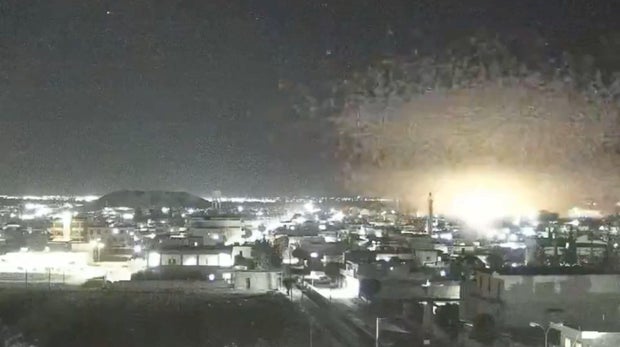Turkey launched airstrikes late Wednesday in Kurdish-held parts of Syria and Iraq in retaliation for a deadly attack at a state-owned defense manufacturer in Ankara that saw at least two attackers kill four people and wound more than a dozen others.
The Turkish government blamed the separatist Kurdistan Workers’ Party (PKK) for what President Recep Tayyip Erdogan called a “nefarious” attack on the Turkish Aerospace Industries headquarters outside the capital.
Video verified by CBS News Confirmed showed damage to electrical infrastructure in Kobani and Qamishli, the de-facto capital of the semi-autonomous region controlled by Kurdish-majority forces in northeast Syria.
The Syrian Democratic Forces (SDF) — who were key U.S. allies in the war against ISIS in the region — said Thursday that 12 people were killed, including two children, and 25 others wounded in widespread Turkish air and artillery strikes. Turkey’s defense ministry said it struck 47 “terrorist targets” in Syria and Iraq.
Social Media/via REUTERS
SDF commander General Mazlum Abdi condemned the Turkish strikes as indiscriminate, saying they had hit civilian infrastructure, including health centers, in northeast Syria.
“We have repeatedly shown our readiness for dialogue. Meanwhile, we affirm that our forces are ready to defend our people and land,” Abdi said in a post on X.
Some 900 U.S. forces remain in the region as part of the international coalition against ISIS, and the SDF has long been America’s primary partner on the ground in northeast Syria. Neither the U.S. Defense Department nor its Central Command had commented on the attack in Ankara, or on Turkey’s retaliatory strikes, by Thursday morning.
Ankara considers the U.S.-backed SDF and its civilian body, the YPG, to be directly linked to the PKK, which has waged a decades-long insurgency in Turkey.
The PKK, long designated a terrorist organization by Turkey and the U.S., is nominally headquartered in the Qandil mountains of northern Iraq. Turkey regularly strikes the region.
No group has claimed responsibility for Wednesday’s attack in Ankara, which came at a time of renewed talks between the Turkish government and the PKK’s leader, Abdullah Ocalan, who has been imprisoned in Turkey for more than two decades.
On Thursday, Ocalan’s nephew Omer, a member of Turkey’s parliament, conveyed a message from the PKK leader suggesting he was prepared to end the violent conflict that has raged since the mid-1980s.
Erdogan ally and Nationalist Movement Party leader Devlet Bahceli had earlier invited Ocalan to address parliament, and said the 75-year-old could be paroled in exchange for disbanding the PKK.
www.cbsnews.com



